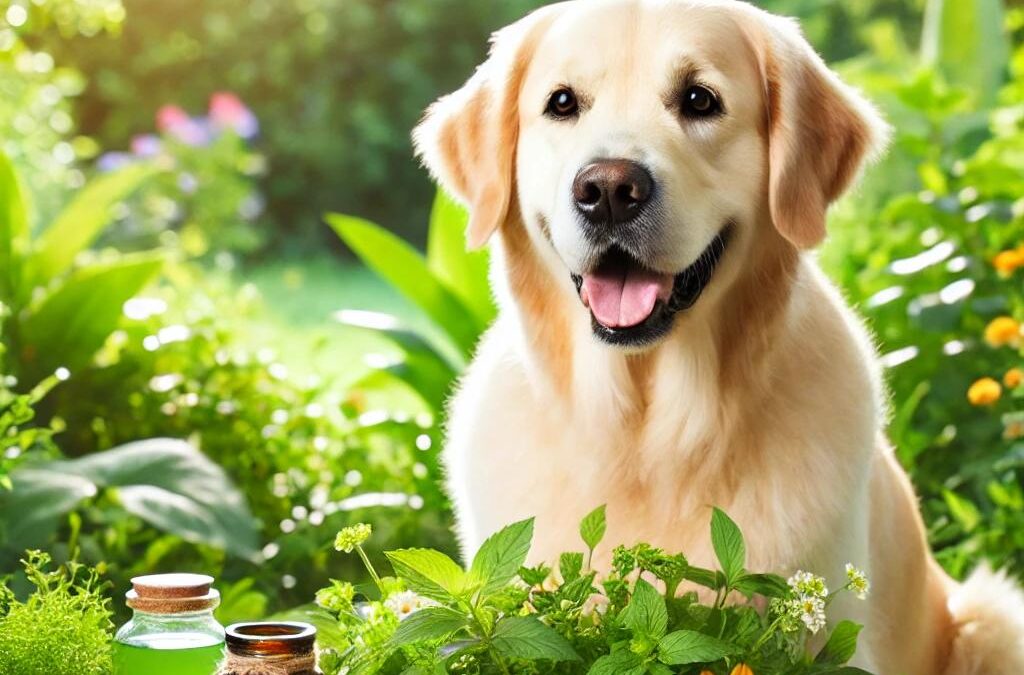
door TCMVET | 9 september 2024 | Voedsel & Gezondheid
Als het om onze honden gaat, weten de meeste huisdiereigenaren de basisprincipes om ze gezond te houden: goede voeding, regelmatige beweging en routinecontroles. Eén belangrijk aspect dat echter vaak over het hoofd wordt gezien, is de gezondheid van het gebit. Verrassend genoeg zijn veel hondeneigenaren zich er niet van bewust hoe belangrijk gebitsverzorging is voor het algehele welzijn van hun huisdier. Sterker nog, het verwaarlozen van de gezondheid van het gebit kan langdurige gevolgen hebben voor de kwaliteit van leven en levensduur van een hond.
Waarom de gezondheid van het gebit van honden cruciaal is
Jarenlang werd algemeen aangenomen dat honden, net als dieren in het wild, geen gebitsverzorging nodig hadden. Wolven en andere wilde dieren poetsen immers hun tanden niet en gaan niet naar de dierenarts, en ze lijken het prima te redden, toch? Helaas is deze aanname ver van de waarheid. Hoewel wilde dieren er misschien "prima" uitzien, kunnen ze in werkelijkheid lijden aan ernstige gebitsproblemen die onopgemerkt blijven. Deze dieren leven niet zo lang als huisdieren en ze doorstaan vaak pijn die wij, als huisdiereigenaren, nooit zouden willen voor onze geliefde metgezellen.
Tandheelkundige aandoeningen bij honden zijn niet alleen een probleem voor hun tanden en tandvlees; ze hebben verstrekkende gevolgen. Onderzoeken hebben aangetoond dat onbehandelde tandheelkundige problemen kunnen leiden tot systemische problemen zoals hartklepinfecties (endocarditis) en leverabcessen. Wat begint als tandplak of tandvleesontsteking kan snel veranderen in iets veel ernstigers, dat het hele lichaam van uw hond aantast en mogelijk zijn levensduur verkort.
De verborgen gevaren van tandziekten
Zonder de juiste tandheelkundige zorg lopen honden risico op een reeks gezondheidsproblemen. Hier zijn enkele van de belangrijkste gevaren die samenhangen met slechte tandheelkundige gezondheid van honden:
- Pain and Discomfort: Tandheelkundige ziektes zijn verschrikkelijk pijnlijk voor honden. Ze worden vaak niet opgemerkt totdat het te laat is, omdat huisdieren instinctief hun pijn verbergen. Regelmatige tandheelkundige controles zijn cruciaal om problemen op te sporen voordat ze verergeren.
- Tandverlies: Naarmate parodontitis vordert, kan het leiden tot verlies van tanden. Dit heeft niet alleen invloed op het vermogen van een hond om te eten, maar leidt ook tot verdere complicaties, zoals infecties en botverlies.
- Hartziekte:Bacteriën van onbehandelde gebitsaandoeningen kunnen in de bloedbaan terechtkomen en het hart aantasten, wat kan leiden tot endocarditis, een aandoening die levensbedreigend kan zijn als deze niet snel wordt behandeld.
- Lever- en nierschade:De bacteriën uit de mond kunnen ook naar andere organen reizen, zoals de lever en de nieren, en ernstige infecties of abcessen veroorzaken.
- Verminderde levensduur: Slechte gebitsgezondheid is direct gelinkt aan een kortere levensduur bij honden. Honden met ernstige gebitsproblemen kunnen korter leven vanwege de druk die gebitsziekten op hun lichaam uitoefenen.
Wat u kunt doen om uw hond te beschermen
Het voorkomen van gebitsproblemen bij honden is makkelijker dan u denkt. Hier zijn enkele belangrijke stappen die elke huisdiereigenaar moet nemen om ervoor te zorgen dat de gebitgezondheid van hun hond optimaal blijft:
- Regelmatig tandenpoetsen: Het dagelijks of minstens meerdere keren per week poetsen van de tanden van uw hond is een van de meest effectieve manieren om tandplak en tandvleesaandoeningen te voorkomen. Gebruik een hondvriendelijke tandenborstel en tandpasta die speciaal is ontworpen voor huisdieren.
- Tandheelkundige kauwspeeltjes en speelgoed: Tandkauwtabletten kunnen helpen tandplak en tandsteen te verminderen. Kauwen stimuleert de speekselproductie, wat als een natuurlijke verdediging tegen bacteriën fungeert.
- Routinematige veterinaire tandheelkundige onderzoeken: Regelmatige tandheelkundige controles bij uw dierenarts zijn essentieel. Tijdens deze bezoeken kan uw dierenarts professionele reinigingen uitvoeren, vroege tekenen van tandheelkundige aandoeningen identificeren en advies geven over het onderhouden van de mondgezondheid van uw hond thuis.
- Professionele reinigingen: Soms zijn poetsen en kauwen niet genoeg. Als uw dierenarts een professionele gebitsreiniging onder narcose aanbeveelt, aarzel dan niet. Deze procedure zorgt voor een grondige reiniging onder de tandvleesrand, wat cruciaal is om parodontitis te voorkomen.
Tandheelkundige gezondheid is meer dan alleen cosmetisch voor uw hond; het is een cruciaal onderdeel van hun algehele welzijn. Als u geen maatregelen neemt, kunnen tandheelkundige aandoeningen leiden tot ernstige gezondheidsproblemen, chronische pijn en zelfs het leven van uw hond verkorten. Als verantwoordelijke huisdiereigenaar zorgt u ervoor dat uw harige vriend jarenlang gezond, gelukkig en pijnvrij blijft door regelmatige tandheelkundige zorg in uw routine op te nemen.
Als u begrijpt hoe belangrijk de gezondheid van het gebit van uw hond is en de nodige maatregelen neemt om hem te beschermen, geeft u hem de beste kans op een lang en gezond leven.

door TCMVET | 21 augustus 2024 | Voedsel & Gezondheid
Het opnemen van gezonde vetten in het dieet van uw hond is essentieel voor hun algehele welzijn. Vetten zoals visolie, lijnzaadolie en kokosolie leveren de nodige vetzuren die het immuunsysteem ondersteunen en helpen ontstekingen te verminderen. Dit artikel onderzoekt de voordelen van deze gezonde vetten en hoe ze de gezondheid van uw hond kunnen verbeteren.
Het belang van gezonde vetten in het dieet van een hond
Gezonde vetten zijn een cruciaal onderdeel van een uitgebalanceerd dieet voor honden. Ze leveren energie, ondersteunen de celgroei, beschermen organen en zijn noodzakelijk voor de opname van bepaalde vitaminen. Het allerbelangrijkste is dat ze rijk zijn aan essentiële vetzuren, zoals omega-3 en omega-6, die essentieel zijn voor het behoud van een gezond immuunsysteem en het verminderen van ontstekingen.
Visolie: een rijke bron van omega-3-vetzuren
Visolie is een van de populairste supplementen voor honden, en dat is niet voor niets. Het is een uitstekende bron van omega-3-vetzuren, waaronder EPA en DHA, die talloze gezondheidsvoordelen hebben:
- Ondersteuning van de werking van het immuunsysteem: Omega-3-vetzuren helpen het immuunsysteem te reguleren, waardoor het efficiënter infecties en ziektes kan bestrijden. Dit is vooral belangrijk voor honden met een verzwakt immuunsysteem of honden die gevoelig zijn voor allergieën.
- Reducing Inflammation: Omega-3's staan bekend om hun ontstekingsremmende eigenschappen. Ze kunnen helpen de ontsteking te verminderen die gepaard gaat met aandoeningen zoals artritis, allergieën en andere chronische ontstekingsziekten.
- Verbetering van de gezondheid van huid en vachtVisolie kan ook de gezondheid van de huid en vacht van uw hond verbeteren, door droogheid, jeuk en schilfering te verminderen en een glanzende, gezonde vacht te bevorderen.
Lijnzaadolie: een plantaardige omega-3-optie
Lijnzaadolie is een andere uitstekende bron van omega-3-vetzuren, met name alfa-linoleenzuur (ALA). Het biedt vergelijkbare voordelen als visolie en is een geweldige optie voor honden met een visallergie:
- Versterking van de immuungezondheid:Net als visolie ondersteunt lijnzaadolie de immuunfunctie door het lichaam te voorzien van essentiële vetzuren die cruciaal zijn voor een sterke immuunreactie.
- Bevorderen van de gezondheid van de gewrichten:De ontstekingsremmende eigenschappen van lijnzaadolie kunnen helpen gewrichtspijn en stijfheid te verminderen, waardoor het gunstig is voor honden met artritis of andere gewrichtsproblemen.
- Ondersteuning van de spijsverteringsgezondheidLijnzaadolie staat er ook om bekend dat het de spijsvertering ondersteunt door een gezonde balans van darmbacteriën te bevorderen en de algehele spijsvertering te verbeteren.
Kokosnootolie: een veelzijdig vet voor gezondheid en welzijn
Kokosnootolie is een uniek vet dat een scala aan gezondheidsvoordelen biedt voor honden. Het bevat middellangeketentriglyceriden (MCT's), die gemakkelijk verteerbaar zijn en snelle energie leveren:
- Verbetering van de immuunfunctieKokosnootolie heeft antimicrobiële eigenschappen die bacteriën, virussen en schimmels kunnen bestrijden en zo een sterk immuunsysteem ondersteunen.
- Reducing Inflammation:De ontstekingsremmende werking van kokosolie kan gunstig zijn voor honden met ontstekingsaandoeningen, doordat het de symptomen kan verzachten en verminderen.
- Ondersteuning van de gezondheid van huid en vachtKokosnootolie kan plaatselijk worden aangebracht of aan het dieet van uw hond worden toegevoegd om de hydratatie van de huid te verbeteren, jeuk te verminderen en een glanzende vacht te bevorderen.
Hoe u gezonde vetten in het dieet van uw hond kunt opnemen
Gezonde vetten toevoegen aan het dieet van uw hond is eenvoudig. U kunt een kleine hoeveelheid visolie, lijnzaadolie of kokosolie aan hun voer toevoegen. Het is belangrijk om uw dierenarts te raadplegen om de juiste dosering te bepalen en ervoor te zorgen dat de vetten geleidelijk worden geïntroduceerd om spijsverteringsproblemen te voorkomen.
Het opnemen van gezonde vetten zoals visolie, lijnzaadolie en kokosolie in het dieet van uw hond kan essentiële vetzuren leveren die de immuunfunctie ondersteunen en ontstekingen verminderen. Deze voordelen dragen bij aan de algehele gezondheid en het welzijn van uw hond, waardoor ze een waardevolle aanvulling zijn op een uitgebalanceerd dieet.

door TCMVET | 20 augustus 2024 | Voedsel & Gezondheid
Het behouden van de gezondheid en het welzijn van uw huisdier omvat meer dan alleen het geven van liefde en genegenheid; het vereist een uitgebalanceerd dieet met essentiële vitaminen. Inzicht in de dagelijkse vitaminebehoeften van uw huisdier kan hun kwaliteit van leven aanzienlijk verbeteren, waardoor ze gezond, actief en vitaal blijven. Deze gids helpt u het belang van verschillende vitaminen voor de dagelijkse gezondheid van uw huisdier te begrijpen.
Waarom vitamines cruciaal zijn voor uw huisdier
Vitaminen spelen een essentiële rol bij het ondersteunen van verschillende lichaamsfuncties bij huisdieren, van het versterken van het immuunsysteem tot het bevorderen van een gezonde huid en vacht. Net als mensen hebben huisdieren een evenwichtige inname van vitaminen nodig om tekorten te voorkomen die tot gezondheidsproblemen kunnen leiden.
Belangrijkste vitamines die uw huisdier nodig heeft
- Vitamine A: Essentieel voor het behoud van een goed zicht, immuunfunctie en cellulaire gezondheid. Het speelt ook een cruciale rol bij het gezond houden van de huid en vacht van uw huisdier.
- Vitamine D: Essentieel voor de gezondheid van de botten, omdat het helpt bij de absorptie van calcium en fosfor. Een tekort aan vitamine D kan leiden tot botaandoeningen en andere gezondheidsproblemen.
- Vitamine E: Een krachtige antioxidant die cellen helpt beschermen tegen schade, de immuunfunctie ondersteunt en een gezonde huid en vacht bevordert.
- Vitamine K: Belangrijk voor de bloedstolling en de gezondheid van de botten. Deze vitamine zorgt ervoor dat het bloed van uw huisdier goed kan stollen in geval van een verwonding.
- B-vitamines (B1, B2, B3, B6, B12):Deze vitamines zijn cruciaal voor de energieproductie, de vorming van rode bloedcellen en het behoud van een gezond zenuwstelsel.
- Vitamine C: Hoewel vitamine C niet voor alle huisdieren essentieel is, omdat sommige huisdieren het zelf kunnen aanmaken, werkt het als een antioxidant en ondersteunt het het immuunsysteem.
- Biotine (vitamine B7): Bevordert een gezonde huid, vacht en nagels. Het is vooral gunstig voor huisdieren met dermatologische problemen.
- Foliumzuur (vitamine B9): Ondersteunt de vorming van rode bloedcellen en is belangrijk tijdens de zwangerschap voor de ontwikkeling van de foetus.
Hoe u ervoor zorgt dat uw huisdier voldoende vitamines binnenkrijgt
Het voeren van een uitgebalanceerd dieet aan uw huisdier is de sleutel om ervoor te zorgen dat ze alle benodigde vitaminen binnenkrijgen. Hoogwaardige commerciële diervoeding is doorgaans samengesteld om te voldoen aan de voedingsbehoeften van huisdieren. Als u echter zelfgemaakte maaltijden voor uw huisdier bereidt, is het essentieel om een dierenarts te raadplegen om ervoor te zorgen dat het dieet uitgebalanceerd is en alle benodigde vitaminen bevat.
Tekenen van vitaminetekorten bij huisdieren
- Doffe vacht of haaruitval: Kan duiden op een tekort aan vitamine A of E.
- Zwakte of lethargie:Kan een teken zijn van een vitamine B-tekort.
- Botafwijkingen of -breuken: Vaak gelinkt aan een tekort aan vitamine D.
- Slechte wondgenezing of overmatig bloeden: Kan een teken zijn van een vitamine K-tekort.
Het begrijpen van de dagelijkse vitaminebehoeften van uw huisdier is cruciaal voor hun algehele gezondheid en welzijn. Of het nu gaat om hoogwaardig commercieel voedsel of zorgvuldig bereide zelfgemaakte maaltijden, ervoor zorgen dat uw huisdier de juiste balans aan vitamines krijgt, zal hen gezond, gelukkig en vol leven houden. Regelmatige controles bij uw dierenarts kunnen helpen het dieet van uw huisdier te controleren en aan te passen indien nodig om tekorten te voorkomen.

door TCMVET | 19 augustus 2024 | Voedsel & Gezondheid
Een uitgebalanceerd dieet is de hoeksteen van een goede gezondheid voor uw huisdier. Net als mensen hebben huisdieren verschillende voedingsstoffen nodig om te gedijen. Zorgen dat het dieet van uw huisdier een gevarieerd aanbod aan voedingsmiddelen en essentiële voedingsstoffen bevat, zoals eiwitten, vetten, koolhydraten, vitaminen en mineralen, is essentieel voor het behoud van hun algehele gezondheid en welzijn. In dit artikel onderzoeken we waarom een uitgebalanceerd dieet cruciaal is voor huisdieren en hoe u dit kunt bereiken.
Waarom een uitgebalanceerd dieet essentieel is voor huisdieren
- Eiwitten voor groei en herstel:
- Eiwitten zijn de bouwstenen van het lichaam van uw huisdier, cruciaal voor groei, weefselherstel en het behouden van een sterk immuunsysteem. Hoogwaardige eiwitbronnen, zoals vlees, vis en eieren, leveren de noodzakelijke aminozuren die huisdieren nodig hebben om spieren, huid en andere weefsels op te bouwen en te behouden.
- Vetten voor energie en een gezonde huid:
- Vetten zijn een essentiële energiebron voor huisdieren en spelen een belangrijke rol bij het behoud van een gezonde huid en een glanzende vacht. Essentiële vetzuren, zoals omega-3 en omega-6, ondersteunen de hersenfunctie, verminderen ontstekingen en bevorderen de gezondheid van het hart. Door bronnen zoals visolie, lijnzaad en kippenvet in het dieet van uw huisdier op te nemen, zorgt u ervoor dat ze de vetten krijgen die ze nodig hebben.
- Koolhydraten voor energie:
- Koolhydraten zijn een andere belangrijke energiebron, die de brandstof levert die huisdieren nodig hebben voor dagelijkse activiteiten. Hoewel honden en katten minder koolhydraten nodig hebben dan mensen, kunnen volle granen, groenten en fruit in hun dieet vezels bieden voor een gezonde spijsvertering en antioxidanten om ziektes te bestrijden.
- Vitaminen voor immuunondersteuning:
- Vitaminen zijn essentieel voor het immuunsysteem, het gezichtsvermogen en de gezondheid van de huid van uw huisdier. Vitamine A ondersteunt bijvoorbeeld het gezichtsvermogen, vitamine D is nodig voor gezonde botten en vitamine E werkt als een antioxidant. Door een verscheidenheid aan groenten, fruit en hoogwaardig dierenvoer toe te voegen, kunt u ervoor zorgen dat uw huisdier de vitamines binnenkrijgt die het nodig heeft.
- Mineralen voor botgezondheid en metabolisme:
- Mineralen zoals calcium, fosfor en magnesium zijn cruciaal voor het behoud van sterke botten en tanden, en ondersteunen ook de metabolische functies. Een dieet rijk aan deze mineralen, afkomstig van vlees, vis en groenten, helpt de structurele integriteit en algehele gezondheid van uw huisdier te behouden.
Hoe u een uitgebalanceerd dieet voor uw huisdier kunt bereiken
- Kies voor hoogwaardige dierenvoeding:
- Begin met een hoogwaardig commercieel dierenvoer dat vlees als eerste ingrediënt vermeldt en vrij is van onnodige vulstoffen. Zoek naar merken die voldoen aan de normen van de AAFCO (Association of American Feed Control Officials), wat zorgt voor een uitgebalanceerd en compleet dieet voor uw huisdier.
- Voeg verse voedingsmiddelen toe:
- Vul het dieet van uw huisdier aan met verse, hele voedingsmiddelen zoals mager vlees, vis, groenten en fruit. Deze toevoegingen kunnen extra vitaminen, mineralen en antioxidanten leveren, wat bijdraagt aan een evenwichtiger en voedingsrijker dieet.
- Raadpleeg een dierenarts:
- Voordat u grote veranderingen aanbrengt in het dieet van uw huisdier, raadpleegt u een dierenarts of een voedingsdeskundige voor huisdieren. Zij kunnen u helpen de juiste balans van voedingsstoffen te bepalen voor de specifieke behoeften van uw huisdier, rekening houdend met factoren als leeftijd, ras, activiteitsniveau en gezondheidsomstandigheden.
- Houd de gezondheid van uw huisdier in de gaten:
- Houd het gewicht, de conditie van de vacht en het energieniveau van uw huisdier in de gaten. Deze indicatoren kunnen u helpen bepalen of het dieet van uw huisdier goed in balans is of dat er aanpassingen nodig zijn.
Een uitgebalanceerd dieet is fundamenteel voor de gezondheid van uw huisdier, en zorgt ervoor dat ze de juiste mix van eiwitten, vetten, koolhydraten, vitaminen en mineralen binnenkrijgen. Door te kiezen voor hoogwaardig dierenvoer, verse, hele voedingsmiddelen te gebruiken en een dierenarts te raadplegen, kunt u uw huisdier een dieet geven dat hun gezondheid en levensduur ondersteunt. Vergeet niet, een gezond huisdier is een gelukkig huisdier!

door TCMVET | 19 augustus 2024 | Voedsel & Gezondheid
Parasieten vormen een aanzienlijke bedreiging voor de gezondheid en het welzijn van huisdieren en blijven vaak onopgemerkt totdat ze ernstige problemen veroorzaken. Deze kleine indringers kunnen leiden tot een scala aan gezondheidsproblemen, van mild ongemak tot levensbedreigende ziekten. Als verantwoordelijke huisdiereigenaar is het cruciaal om de gevaren van parasieten te begrijpen en hoe u uw huisdieren kunt beschermen. Dit artikel onderzoekt de verschillende soorten parasieten die huisdieren kunnen treffen, de gezondheidsrisico's die ze vormen en de beste manieren om plagen te voorkomen en te behandelen.
Soorten parasieten die huisdieren treffen
- Externe parasieten:
- Vlooien: Deze kleine, bloedzuigende insecten komen veel voor bij zowel honden als katten. Vlooien veroorzaken jeuk, allergische reacties en kunnen ziektes overbrengen zoals lintwormen en door vlooien overgebrachte tyfus.
- Teken: Teken hechten zich aan de huid van uw huisdier en voeden zich met hun bloed. Ze zijn bekende dragers van ernstige ziektes zoals de ziekte van Lyme, anaplasmose en ehrlichiose.
- Mijten:Mijten zijn kleine parasieten die schurft kunnen veroorzaken, wat kan leiden tot hevige jeuk, haaruitval en huidinfecties.
- Interne parasieten:
- Wormen:Darmwormen, waaronder rondwormen, haakwormen en lintwormen, kunnen bij huisdieren spijsverteringsproblemen, gewichtsverlies en bloedarmoede veroorzaken.
- Hartwormen: Hartwormen worden overgebracht door muggen en vormen een ernstige bedreiging, vooral voor honden. Ze kunnen hartfalen en andere orgaanschade veroorzaken als ze niet worden behandeld.
- Giardia: Deze microscopisch kleine parasiet leeft in de darmen en kan diarree en andere maag- en darmklachten veroorzaken.
Gezondheidsrisico's in verband met parasieten
Parasieten kunnen een breed scala aan gezondheidsproblemen bij huisdieren veroorzaken, waaronder:
- Huidirritatie en allergieënExterne parasieten zoals vlooien en mijten kunnen hevige jeuk veroorzaken, wat kan leiden tot huidinfecties, haaruitval en allergische reacties.
- Gastro-intestinale problemen: Interne parasieten veroorzaken vaak braken, diarree en gewichtsverlies. In ernstige gevallen kunnen ze leiden tot ondervoeding en bloedarmoede.
- OrgaanschadeHartwormen en andere parasieten die de inwendige organen aantasten, kunnen aanzienlijke schade veroorzaken, wat kan leiden tot chronische gezondheidsproblemen of zelfs de dood.
- Overdracht van ziekten:Veel parasieten kunnen ziekten overbrengen die zowel huisdieren als mensen kunnen treffen, zoals de ziekte van Lyme en lintwormen.
- Verzwakking van het immuunsysteem:Chronische parasietenplagen kunnen het immuunsysteem van uw huisdier verzwakken, waardoor hij vatbaarder wordt voor andere ziekten.
Preventie en behandeling van parasieten
Het voorkomen van parasietenplagen is essentieel om uw huisdier gezond te houden. Hier zijn enkele tips:
- Regelmatige dierenartscontroles: Regelmatige bezoeken aan de dierenarts zijn essentieel voor vroege detectie en behandeling van parasieten. Uw dierenarts kan de beste preventieve maatregelen voor uw huisdier aanbevelen op basis van hun levensstijl en gezondheidsstatus.
- Gebruik preventieve medicijnenMaandelijkse preventieve maatregelen tegen vlooien, teken en hartworm zijn zeer effectief bij het beschermen van uw huisdier tegen deze veelvoorkomende parasieten.
- Zorg voor een goede hygiëne:Verschoon regelmatig het beddengoed van uw huisdier, stofzuig uw huis en houd uw huisdier schoon om het risico op externe parasieten te verkleinen.
- Houd het gedrag van uw huisdier in de gaten: Let op tekenen van ongemak, zoals overmatig krabben, likken of veranderingen in de eetlust. Deze kunnen duiden op een parasietenprobleem.
- Snelle behandeling: Als uw huisdier tekenen van een parasietenplaag vertoont, zoek dan onmiddellijk veterinaire hulp. Vroegtijdige behandeling kan voorkomen dat de parasiet ernstigere gezondheidsproblemen veroorzaakt.
Parasieten vormen een verborgen maar significante bedreiging voor de gezondheid van uw huisdier. Door de soorten parasieten te begrijpen die uw huisdieren kunnen treffen, de symptomen te herkennen en proactieve maatregelen te nemen om plagen te voorkomen, kunt u uw huisdieren beschermen tegen deze schadelijke indringers. Regelmatige bezoeken aan de dierenarts, preventieve medicijnen en het onderhouden van een schone omgeving zijn essentiële stappen om ervoor te zorgen dat uw huisdieren een gezond, parasietvrij leven leiden.

door TCMVET | 17 augustus 2024 | Voedsel & Gezondheid
Kankerpreventie bij huisdieren is een groeiende zorg voor veel huisdiereigenaren. Hoewel genetica en omgevingsfactoren een belangrijke rol spelen, kan het handhaven van een gezonde interne omgeving door middel van ontgifting een krachtige manier zijn om het risico op kanker te verminderen. Het ontgiften van het lichaam van uw huisdier helpt schadelijke toxines te elimineren, ondersteunt de algehele gezondheid en versterkt het immuunsysteem, waardoor de kans kleiner wordt dat kankercellen zich ontwikkelen. In dit artikel onderzoeken we natuurlijke methoden om uw huisdier te ontgiften en hoe deze praktijken kunnen bijdragen aan kankerpreventie.
1. Het belang van ontgifting begrijpen
Ontgiften is het proces waarbij schadelijke stoffen uit het lichaam worden verwijderd. Deze stoffen kunnen zich ophopen door een slecht dieet, milieuvervuiling en dagelijkse blootstelling aan chemicaliën.
- Ophoping van toxines: Na verloop van tijd kunnen er zich gifstoffen ophopen in het lichaam van uw huisdier, wat kan leiden tot ontstekingen, celschade en een verzwakt immuunsysteem. Deze factoren dragen bij aan de ontwikkeling van kanker.
- Versterking van de immuunfunctie: Regelmatig ontgiften ondersteunt de lever en de nieren, de belangrijkste ontgiftingsorganen van het lichaam, waardoor ze efficiënt kunnen functioneren en gifstoffen kunnen verwijderen voordat ze schade kunnen aanrichten.
2. Natuurlijke manieren om uw huisdier te ontgiften
Er zijn verschillende natuurlijke methoden die u kunt gebruiken om het lichaam van uw huisdier te ontgiften en zo de algemene gezondheid te ondersteunen.
- Dieet Detox: Het voeren van een hoogwaardig, natuurlijk dieet aan uw huisdier is een van de meest effectieve manieren om ontgifting te bevorderen. Voeg hele voedingsmiddelen toe zoals verse groenten, mager vlees en biologische granen, en vermijd bewerkte voedingsmiddelen met kunstmatige toevoegingen.
- Herbal Supplements: Bepaalde kruiden, zoals mariadistel, paardenbloemwortel en kurkuma, staan bekend om hun ontgiftende eigenschappen. Deze kruiden ondersteunen de leverfunctie, verminderen ontstekingen en helpen gifstoffen uit het lichaam te verwijderen.
- Hydratatie: Zorg ervoor dat uw huisdier altijd toegang heeft tot schoon, vers water. Goede hydratatie is essentieel om gifstoffen weg te spoelen en de gezondheid van de nieren te behouden.
3. Verminderen van milieutoxines
Naast het aanpassen van het dieet is het voor een effectieve ontgifting van uw huisdier ook van belang dat u de blootstelling van uw huisdier aan omgevingsgifstoffen tot een minimum beperkt.
- Chemievrij leven: Verminder de blootstelling van uw huisdier aan huishoudelijke chemicaliën, zoals schoonmaakmiddelen, pesticiden en gazonbehandelingen. Kies voor natuurlijke, huisdiervriendelijke alternatieven om uw thuisomgeving zo toxinevrij mogelijk te houden.
- Vermijden van besmette gebieden: Vermijd bij het uitlaten van uw huisdier gebieden die mogelijk zijn behandeld met pesticiden of andere chemicaliën. Deze stoffen kunnen door de huid worden opgenomen of worden ingenomen, wat leidt tot een ophoping van toxines.
- Luchtkwaliteit: Zorg voor een goede luchtkwaliteit in uw huis door luchtreinigers te gebruiken en uw ruimte regelmatig te ventileren. Slechte luchtkwaliteit kan bijdragen aan blootstelling aan toxines, met name bij huisdieren met ademhalingsproblemen.
4. Ondersteuning van het detoxproces met lichaamsbeweging
Regelmatige lichaamsbeweging is een ander essentieel onderdeel van een succesvol detoxregime.
- Oefening voor de bloedsomloop: Beweging helpt de bloedsomloop te verbeteren, wat cruciaal is voor de efficiënte verwijdering van gifstoffen uit het lichaam. Dagelijkse wandelingen, speeltijd en interactieve activiteiten houden het lichaam van uw huisdier actief en ondersteunen de algehele gezondheid.
- Lymfedrainage: Fysieke activiteit stimuleert ook het lymfestelsel, dat een cruciale rol speelt bij ontgifting. Een gezond lymfestelsel zorgt ervoor dat toxines efficiënt worden getransporteerd naar de ontgiftingsorganen voor eliminatie.
5. Regelmatige controles en veterinaire ondersteuning
Hoewel natuurlijke ontgiftingsmethoden nuttig zijn, is regelmatige veterinaire zorg van essentieel belang om de gezondheid van uw huisdier te behouden en kanker te voorkomen.
- Routinematige gezondheidscontroles: Regelmatige bezoeken aan de dierenarts zorgen voor een vroege detectie van mogelijke gezondheidsproblemen en bieden de mogelijkheid om het detoxregime van uw huisdier met een professional te bespreken. Uw dierenarts kan aanvullende supplementen of aanpassingen aanbevelen op basis van de specifieke behoeften van uw huisdier.
- Vaccinatie en parasietenbestrijding: Door uw huisdier regelmatig te laten vaccineren en parasieten te bestrijden, beschermt u hem tegen ziektes die zijn immuunsysteem kunnen verzwakken. Hierdoor worden ontgiftingspogingen effectiever.
Conclusie
Het ontgiften van uw huisdier is een proactieve aanpak van kankerpreventie, ter ondersteuning van hun algehele gezondheid en welzijn. Door natuurlijke ontgiftingsmethoden te integreren, zoals een schoon dieet, kruidensupplementen en regelmatige lichaamsbeweging, kunt u helpen de opbouw van toxines te verminderen en het immuunsysteem van uw huisdier te versterken. Raadpleeg altijd uw dierenarts voordat u met een nieuw ontgiftingsregime begint om er zeker van te zijn dat het geschikt is voor de gezondheid en levensstijl van uw huisdier.






